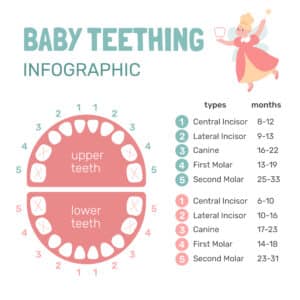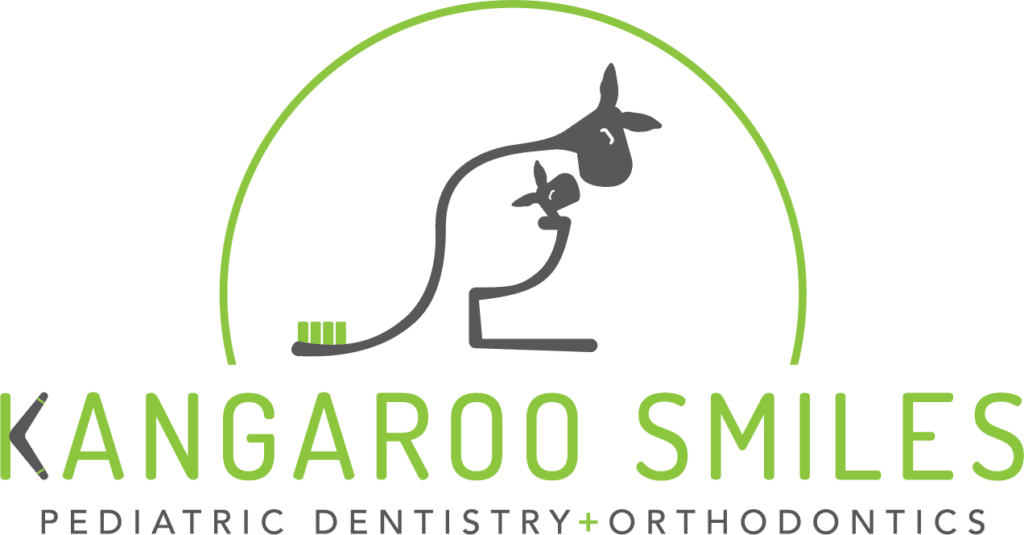Waiting for your baby’s first set of teeth to erupt is exciting! At the same time, you may have a lot of questions as teething can be a painful process for your little one. In what order do their baby teeth suppose to come out? How can I best keep their primary teeth healthy? When do they fall out?
In this comprehensive guide, we’ll answer these questions and more so you can be prepared for your baby’s teething journey. Our Dentist in Methuen will help you learn how to take care of your baby’s teeth and gums along the way, developing good dental habits for beautiful and healthy teeth.
Baby Teething Timeline
Baby teeth come in at different times for each child. Generally, babies start to get teeth around 6 months old, when the lower central incisors erupt first. Most of them also get a full set of baby teeth by 3. To give you a clearer idea, below is the estimated timeline for when baby teeth will erupt:

- Lower central incisors: 6 to 10 months
- Upper central incisors: 8 to 12 months
- Upper lateral incisors: 9 to 13 months
- Lower lateral incisors: 10 to 16 months
- Upper first molars: 13 to 19 months
- Lower first molars: 14 to 18 months
- Upper canines: 16 to 22 months
- Lower canines: 17 to 23 months
- Lower canines: 17 to 23 months
- Upper second molars: 25 to 33 months
- Growth of jaw and facial bones: Ages 4 to 6
- Tooth loss: Ages 6 to 12
- A full set: Age 13
Signs of Teething and Best Relief Options
Your baby may experience a few uncomfortable symptoms when their teeth are coming in. Common signs of teething include:
- excessive drooling
- swollen gums
- lack of appetite
- irritability
- trouble sleeping
- biting or chewing on things
- ear pulling
- redness around the mouth, chin, and neck
One important thing to note is that fever is NOT considered a sign of teething. An analysis of various studies concluded that teething may cause a slight rise in the baby’s body temperature, but it is not yet considered a fever.
It’s crucial to learn about this as parents of teething babies may overlook a more serious medical problem and wrongly attribute their baby’s fever to teething. Similarly, NO strong evidence has proven that teething causes diarrhea or vomiting so consult their pediatrician accordingly.
Some of the best ways to relieve baby teeth discomfort include:
- Rubbing their gums with a clean finger, washcloth, or the back of a cold spoon
- Allowing them to chew on a cold teething ring or cold food
- Giving them a gentle massage with a teething gel or powder (make sure they are safe and specifically designed for this purpose)
Things to Look Out For
It’s important to keep an eye out for signs of discomfort since teething can cause more than just mild irritation. If your baby experiences severe pain, refuses to eat, or has a fever higher than 100.4°F (38°C), contact their pediatrician right away.
You also need to monitor the health of your child’s baby teeth. Tooth decay does not only affect adult teeth but can happen in baby teeth as well. And there are many negative impacts associated with developing early cavities that you should know about. These include:
- Pain and discomfort
- Infections and abscesses
- Staining of the enamel
- Difficulty eating and speaking
- Increased risk of cavities in adult teeth
- The potential need for early extraction
- Early tooth loss
- The crookedness of the permanent teeth
Check for the following signs of cavities and decay:
- White spots or patches on the teeth
- Brown, black, or gray discoloration in the enamel
- Pain when biting down
Other problem signs to look out for:
- Grinding, clenching, or gnawing
- Milk teeth growing crooked
- Noticeable gaps between baby teeth
- Losing baby teeth early
Keeping Baby Teeth Healthy
It’s crucial to keep your baby’s primary teeth healthy to promote good oral hygiene and reduce the risk of tooth decay. To help do this, brush their teeth twice a day with a soft-bristled baby toothbrush and fluoride-free toothpaste. Here are some of the best oral hygiene practices for your child’s baby teeth:
- Brush their teeth twice a day: once during the day and another before bedtime.
- Apply circular motions to reach the entire surface of each tooth.
- Make sure they don’t swallow excess toothpaste by teaching them to spit it out.
- Brush their teeth for two minutes each time when all their teeth have erupted.
- Floss their teeth when all their baby teeth have come in.
- Help your child brush and floss their teeth until they can properly do it on their own (usually at age seven).
- Make sure your child visits the dentist regularly for evaluation and care.
Dental Care for Baby Teeth
To ensure the best oral health for your child, regular dental care is recommended. The American Academy of Pediatrics recommends that children have their first dental visit at age one or when the first tooth erupts.
During this visit, your child’s dentist will assess their gums and teeth for any potential problems and advise you on proper oral care techniques. The dentist can also help detect any potential oral problems and provide preventive measures to protect your child’s teeth from cavities and decay.
From then on, make sure to stick to a regular schedule of dental visits for your child. This will help them maintain healthy and strong baby teeth until the permanent ones come in. Some of the preventive measures that the dentist can provide include:
- Fluoride treatments
- Dietary counseling
- Gentle cleanings
- Sealants
- Oral hygiene instruction
- Tooth-colored fillings (for cavities)
- Regular checkups and assessments
At age seven, kids are also recommended to see an orthodontist if there are any issues with their primary teeth. This is to ensure that when the permanent teeth come in, they will be straight and healthy.
Best Pediatric Dentist in Lowell & Methuen, MA
If you’re looking for a pediatric dentist in Lowell, MA, or Methuen, MA, then look no further than our dedicated dental team at Kangaroo Smiles Pediatric Dentistry & Orthodontics. Our experienced and passionate dentists for kids provide the best quality of care for children of all ages.
Kangaroo Smiles offers preventive, restorative, emergency, and orthodontic services and use the latest technologies with gentle, personalized care. We also provide sedation and anesthesia options to ensure a comfortable and stress-free experience for your child.
We understand the importance of teaching children good oral hygiene habits, and that’s why we provide education, specialized treatments, and preventive measures to ensure your child’s teeth are healthy and strong. The areas we serve include Lowell, Methuen, Essex County, Lawrence, North Andover, and Salem.
Call us today to schedule your child’s dental appointment and start them on their path to a lifetime of healthy smiles!


